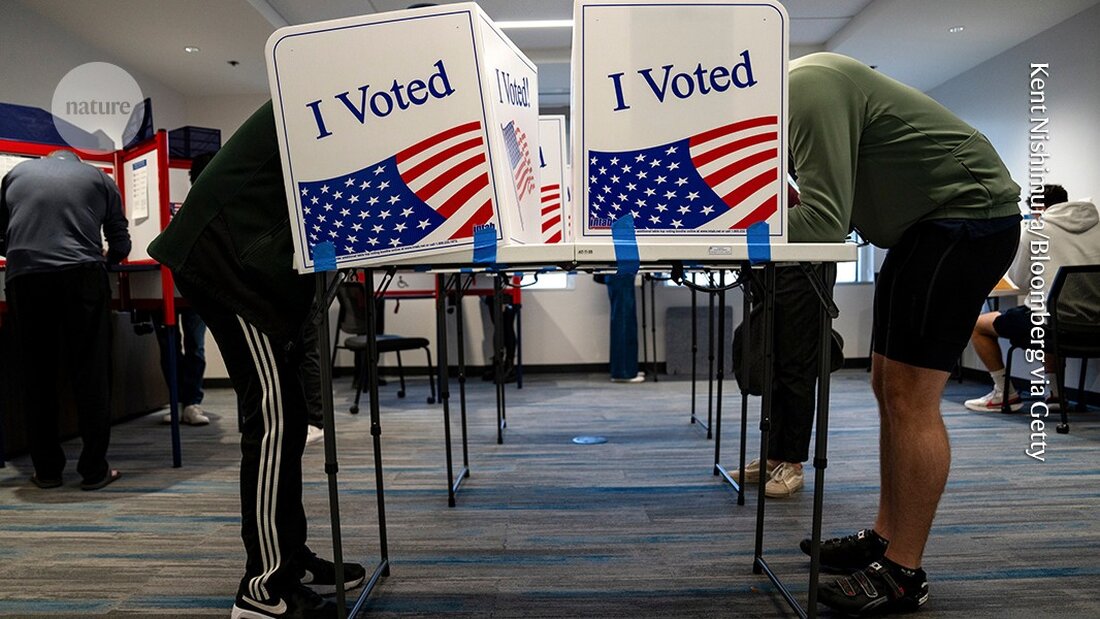The 2024 US election: A defining moment for science – The opinion of Nature readers
The 2024 US elections are crucial for scientists: What impact will the outcome have on climate, health and research?

The 2024 US election: A defining moment for science – The opinion of Nature readers
The US presidential election has divided the nation, but scientists seem to agree. According to a survey in which around 2,000 readers took part, the was carried out by Nature magazine, most researchers, both from and within the US, support Democratic candidate Kamala Harris. Additionally, a third of scientists voting for her said they might change their plans for where to live or study if Republican candidate Donald Trump wins on November 5.
About nine in 10 respondents — about half of whom live outside the U.S. — think the U.S. election is important and believe it could have significant impact on issues such as climate change, public health and science policy (see “A Powerful Election”). Although the survey is not statistically representative of Nature readers or the scientific community as a whole, it highlights widespread concern about the future of the United States and its global position. In particular, many respondents expressed fear about the rise of extremism and authoritarian rhetoric under former President Trump.
“Part of me thinks you should walk right into the fire,” says Erik Poppleton, a U.S. biophysicist at the Max Planck Institute for Medical Research in Heidelberg, Germany, who took part in the survey. “But at the moment I feel more comfortable staying in Europe if Trump is elected, which is sad because I want to come back.”
Poppleton is not alone. About 77% of respondents identified themselves as researchers, and 86% said the choice would impact whether the United States remains an attractive place to pursue a scientific career. “A country that doesn’t believe in facts is not a safe place to build a career in science,” one respondent wrote. The answers were posted earlier this month the Nature website, on social media and in Nature Briefing, an email newsletter.
Climate change and science
Climate change topped the list of reasons respondents gave as to why the election was important to them personally, with 34% selecting this issue. The emphasis on global warming probably reflects that United States is the second largest emitter of greenhouse gases in the world and are alone capable of driving the world over the climate cliff. While Harris has promised to address the climate crisis and continue investing in green energy, Trump says he wants to advance fossil fuel development.
Respondents again cited progress on climate change as the top reason why the election is important to science (26%), followed by concerns about science funding (24%) and global science policy (23%).
But a minority believed such fears were overblown, arguing that science would advance regardless of politics or that neither major candidate was prepared to address the major challenges facing the United States and the world. “Objective, unbiased science based on facts will always have a place in improving the human condition,” wrote one respondent who wanted the cartoon character Bugs Bunny to be president. “The question is whether people want to hear the facts or not.”
concerns and priorities
A clear majority of respondents – 86% – support Harris, with the percentage roughly the same for both U.S. (944 respondents) and foreign (842 respondents) respondents (see “Support for Harris”). Still, 6% of respondents preferred Trump and 4% said they preferred alternative candidates such as Jill Stein of the US Green Party and avowed socialist Bernie Sanders, who lost the Democratic nomination to Hillary Clinton in 2016.
Concerns and priorities differed significantly between Harris and Trump supporters. Harris supporters were more likely to cite climate change, as well as security issues, social justice and public health, as their top concerns. Some also said that trust in science is important. While Trump portrays himself as politically motivated, Kate Radford, a biochemistry and biophysics researcher at the California Institute of Technology in Pasadena, writes: "Harris and her party demonstrate a willingness to update policies based on evidence. This is the heart of science."
Trump's supporters tended to emphasize economic and security issues as their main concerns. Nature contacted one such respondent, Jacob van Rensburg, an economist at a shipping company in Johannesburg, South Africa, who said he believed a second Trump administration would be more likely to end wars in Ukraine and the Middle East. “Funding science – particularly in the area of climate change – is irrelevant when widespread wars are taking place,” van Rensburg said.
Stay or go?
Researchers in the United States were more than twice as likely as their international counterparts to consider making important changes to their lives if their preferred candidate lost (see “Imminent Dilemmas”), although this sentiment varied by political preference. Harris supporters were 50% more likely to say they would consider moving or changing their college destination than those who favor Trump.
Respondents to the Nature survey included scientists thinking about coming to the United States, as well as U.S. scientists and immigration scientists thinking about staying in the country. In many cases, respondents pointed to the danger of a second Trump presidency. Trump has raised concerns about racism and xenophobia through his anti-immigrant rhetoric and various policies implemented during his presidency from 2017 to 2020, the made it more difficult for foreign students and scholars to study and work in the United States.
One respondent said he left the United States once during Trump's presidency because he feared the country would become a failed democracy. He went back because of a job offer, but says he's glad he never gave up his home country's citizenship. “I’m worried I may have to try walking again,” he wrote.

 Suche
Suche
 Mein Konto
Mein Konto
